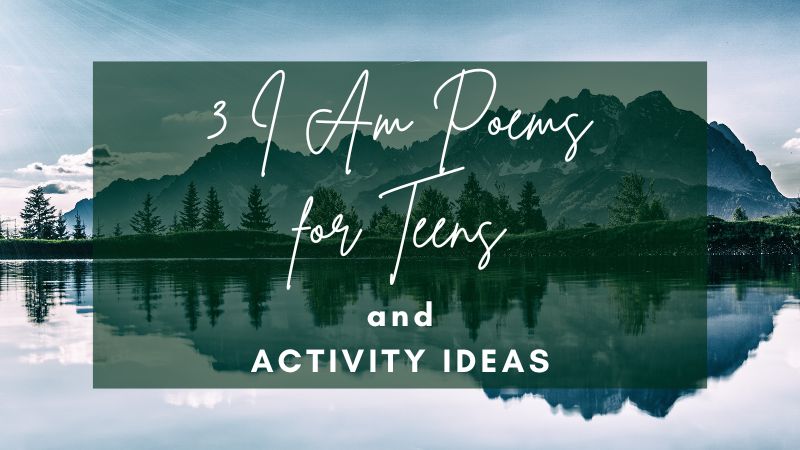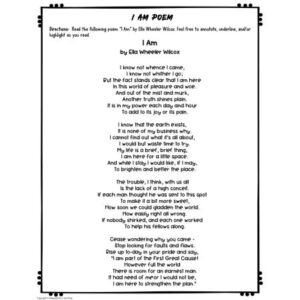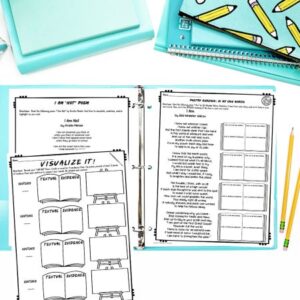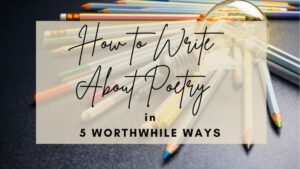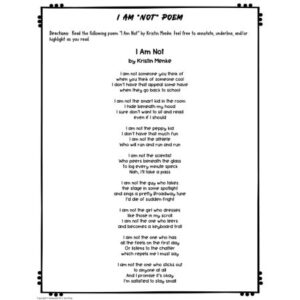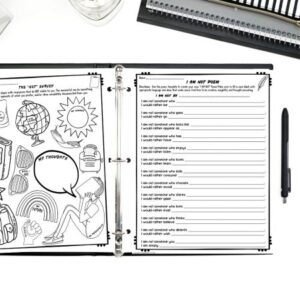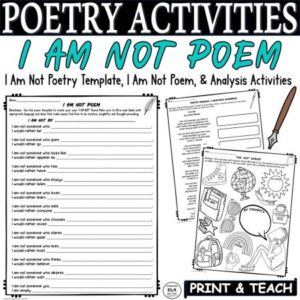Ever since I can remember, I have loved writing poetry. I think many teens go through a period of poetic musing, reflections, and emulation, just like I did. Sometimes, however, the process of writing poetry can be difficult to wrap your mind around. Where do I start? How can I begin? That’s why I like to teach I Am Poems!
There are so many I Am Poems out there on the internet, but I prefer the versions below to read with students for challenging analyses. Then, I give students templates to follow as a guide so every one of them can create their own I Am Poems.
Keep reading for 3 Unexpected I Am Poems For Teens and Activity Ideas!
Need help with Test Prep? Check out this FREE Pack of 3 Test Prep Activities to help students achieve success on standardized tests!
3 Unexpected I Am Poems For Teens
I Am by Ella Wheeler Wilcox
I know not whence I came,
I know not whither I go;
But the fact stands clear that I am here
In this world of pleasure and woe.
And out of the mist and murk,
Another truth shines plain.
It is in my power each day and hour
To add to its joy or its pain.
I know that the earth exists,
It is none of my business why.
I cannot find out what it’s all about,
I would but waste time to try.
My life is a brief, brief thing,
I am here for a little space.
And while I stay I would like, if I may,
To brighten and better the place.
The trouble, I think, with us all
Is the lack of a high conceit.
If each man thought he was sent to this spot
To make it a bit more sweet,
How soon we could gladden the world,
How easily right all wrong.
If nobody shirked, and each one worked
To help his fellows along.
Cease wondering why you came —
Stop looking for faults and flaws.
Rise up to day in your pride and say,
I am part of the First Great Cause!
However full the world
There is room for an earnest man.
It had need of me or I would not be,
I am here to strengthen the plan.
ACTIVITY IDEAS
1. Paraphrasing
Paraphrasing is such a useful skill, so before I try analyzing the higher meaning of a poem or its figurative language, I simply paraphrase lines within each stanza of I Am poems. I use the activity “In My Own Words” to dissect the meaning of various lines.
Ex. “It is in my power each day and hour” / Ex. Paraphrase-I have the ability all of the time
Ex. “To add to its joy or its pain.” / Ex. Paraphrase-to make life happy or painful
Through this process, students will be able to understand more of the I Am poems than they realize.
2. Contrast Analysis
Instead of summarizing or paraphrasing each line, students could write about the opposite meaning of the lines in the poem. It requires them to dig a little deeper into the poem’s meaning!
Ex. “It is in my power each day and hour” / Ex. Opposite-I have no ability anytime
Ex. “To add to its joy or its pain.” / Ex. Paraphrase-to take away happiness or suffering
3. Vocabulary Dissection
There are so many tough words in many poems, so before even reading poetry, you might want students to research higher-level words ahead of time. Here are some words to check out in this “I Am” poem beforehand:
- whence
- pleasure
- murk
- whither
- brief
- conceit
- shirked
- fellows
I like using graphic organizers with various options depending on my students’ needs!
Need more ideas for poetry analysis? Check out How to Write About Poetry in 5 Worthwhile Ways!
I Am Not by Kristin Menke
I am not someone you think of
when you think of someone cool
I don’t have that appeal some have
when they go back to school
I am not the smart kid in the room
I hide beneath my hood
I sure don’t want to sit and read
even if I should
I am not the peppy kid
I don’t have that much fun
I am not the athlete
Who will run and run and run
I am not the scientist
Who peers beneath the glass
To log every minute speck
Nah, I’ll take a pass
I am not the guy who takes
the stage in some spotlight
and sings a pretty Broadway tune
I’d die of sudden fright
I am not the girl who dresses
like those in my scroll
I am not the one who leers
and becomes a keyboard troll
I am not the one who has
all the feels on the first day
Or listens to the chatter
which repels me I must say
I am not the one who sticks out
to anyone at all
And I promise it’s okay
I’m satisfied to stay small
ACTIVITY IDEAS
1. Summarizing
My go-to strategy for poetry analysis is summarizing, particularly writing one-sentence summaries. Instead of writing a whole paragraph for each stanza or poem, I enjoy having students write a single sentence encapsulating the meaning of a stanza, chunk, or poem.
Surprisingly, this activity requires a lot of critical thinking because students need to identify the topic, evidence, and gist of the line, stanza, or entire poem.
STANZA #1
I am not someone you think of
when you think of someone cool
I don’t have that appeal some have
when they go back to school
Ex. 1-Sentence Summary- The speaker of the poem does see himself/herself as the cool kid at school.
2. Poetry Analysis
This “I Am Not” poem offers another way to consider typical I Am poems! By analyzing this poem, we can provide a new lens with which to see our own selves. You might do a character analysis for this poem.
Check out the evidence for various traits (external and internal) and what they reveal about the meaning of the poem. What message does the poet hope to convey?
3. Writing Poetry
You could use a template or the model poem above as you prompt students to write their own poems.
Examples Directions: Use the poem template to create your own “I AM NOT” Poem! Make sure to fill in each blank with appropriate language and ideas that make sense. Feel free to be creative, insightful, and thought-provoking.
Need help teaching students how to write their I Am Poems? Click here!
I Am!
ACTIVITY IDEAS
1. Imagery Examination
Imagery is description linked to the five senses (sight, sound, touch, taste, smell). Poetry typically has a ton of imagery packed in because there is only so much time and space to get the meaning across to the audience.
My favorite pieces of imagery from this poem by John Clare are the following:
- “shadows of life”
- “I am toss’d”
- “living sea of waking dream”
- “sleep as I in childhood sweetly slept”
- “the grass below; above the vaulted sky”
Use these questions to examine the meaning of each image:
- What words stand out in each piece of imagery?
- Why might the poet use this imagery?
- What mood is brought about through this imagery?
- How does the imagery contribute to the message/theme of the poem?
2. Visualization
As students analyze I Am poems, you may want to incorporate some visualization activities to inspire students on a path to loving poetry! Taking the time to create images based on what they have read makes the poetry journey more interesting and accessible.
Students can visualize vocabulary, specific lines, the setting, a certain person in the poem, etc. As long as evidence is used to support their ideas and is appropriate, they can create any images they like.
In fact, you could extend the activities by creating a response image. Ex. In an image/visual, respond to the poem. How does it make you feel? What does it make you think of?
I Am Poems Resource
Want to help your upper middle and high school students personally connect to poetry with a not-so-typical I AM POEMS? Check out this poetry activities pack to guide your students in poetry analysis of 2 I Am Poems, assist students with self-reflection in an engaging getting-to-know-you worksheet, and aid in producing poetry writing with EASE!
Use these I Am Poems for BACK TO SCHOOL season or within a FULL POETRY UNIT!
Just PRINT & TEACH with easy-to-use activities for I Am Poems!!

